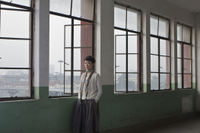MOVIE REVIEW
24 City (2008)
Perhaps shamefully, this was the first film of Jia Zhangke’s I’d ever watched all the way through; my only previous experience of his work being approximately half of “Unknown Pleasures.” I have probably always held a slight suspicion that he’s one of those extensively garlanded East Asian minimalists who owes a good portion of his reputation to the articulate patronage of the evangelizing critic Tony Rayns. I should probably reassess this reductive preconception because I enjoyed “24 City” very much, even though I get the impression it’s one of Mr. Jia’s minor works.
The film is an unusual hybrid of documentary and drama that tells the story of the industrialization of a town called Chengdu over the last 50 years, mostly through the use of talking-head interviews, some of which are apparently real but most of which are scripted and acted.
The history of Chengdu – like many places in China – is inextricably linked to the whims of communist officialdom during the era. In the post-war years, this rural town was completely transformed to support a huge new aeronautics factory, constructed as part of Mao Zedong’s Great Leap Forward policy of moving important munitions factories to the Chinese interior, often at great environmental cost. Mao’s later Cultural Revolution saw many of China’s remaining educated classes moved from the cities to work in factories like Chengdu’s. We hear accounts from factory workers who took part in both of these momentous social experiments.
As China’s numerous conflicts began to abate in the 1980s, Chengdu factory adapted from supplying military aircraft to civilian ones, but the oppressive working environment and management tyranny seem to continue as before. Someone relays the story of a foreman repeatedly taunting his workers about an aircraft crash that killed a young businessman, an incident he solely blames on their poor workmanship.
Eventually the factory can’t even support commercial production at all, so it’s decommissioned and the land is sold to another government department that plans to create a sparkling modern development: the 24 City of the title. And so China’s development enters a new cycle, but with the same breathless intensity and dedication as ever.
Typical stories from all of these periods are told through various testimonies in chronological order, occasionally interspersed with quotations from poems by Yeats and excerpts from Huangmei operas like “Dream of the Red Chamber.” Which sections of the film are genuine documentary and which are scripted isn’t clear, but Mr. Jia enjoys toying with the resultant ambiguity. Joan Chen plays a character who is nicknamed Little Flower after the character played by Ms. Chen herself in the eponymous 1980 film.
The final witness is a TV newsreader, born in 1982, who’s so pained by her parents’ stories of factory hardships that her only motivation in life is to work hard herself so she can provide them with placatory luxury items. As the final shot pans across the crammed skyline of Chendgdu, a once mountainous wilderness urbanized beyond all recognition, it’s plain that Mr. Jia’s film can be read as an indictment of China’s constant and unrelenting renewal at the expense of its heritage. It’s also fascinating insight into the relationship between the Chinese government, industry, its people and the often forgotten land upon which China’s many schemes and dreams rest.
At the Times BFI 52nd London Film Festival screening, “24 City” was preceded by a new short film from Mr. Jia, “Cry Me a River.” Shot on a digital video format, the film concerns a reunion of former university students 10 years after graduation, as they eat a meal and discuss their former relationships and new lives. I had the suspicion the film might be a wry commentary on the reputation of China’s legendary Fifth Generation filmmakers, as the group’s former tutor ridicules his former protégés for being students who held great promise but failed to live up to their hype. If such cinematic sacrilege was Mr. Jia’s intention, then I applaud his cheekiness; but I may have been reading too much into it.
24 CITY
Opens on June 5 in Manhattan and on April 30, 2010 in Britain.
Directed by Jia Zhang-ke; written by Mr. Jia and Zhai Yongming; directors of photography, Yu Likwai and Wang Yu; edited by Lin Xudong, Kong Jinlai and Li Haiyang; music by Yoshihiro Hanno and Lim Giong ; art director, Liu Qiang; produced by Masayuki Mori, Yoshida Takio, Sadai Yuji, Kubo Satoshi, Xu Pengle, Zhu Jiong and Ma Ning; released by Cinema Guild (United States) and New Wave Films (Britain). In Mandarin, with English subtitles. Running time: 1 hour 47 minutes. This film is not rated by M.P.A.A. and rated U by B.B.F.C.
WITH: Joan Chen (Gu Minhua), Lv Liping (Hao Dali), Zhao Tao (Su Na) and Chen Jianbin (Zhao Gang).

Comments